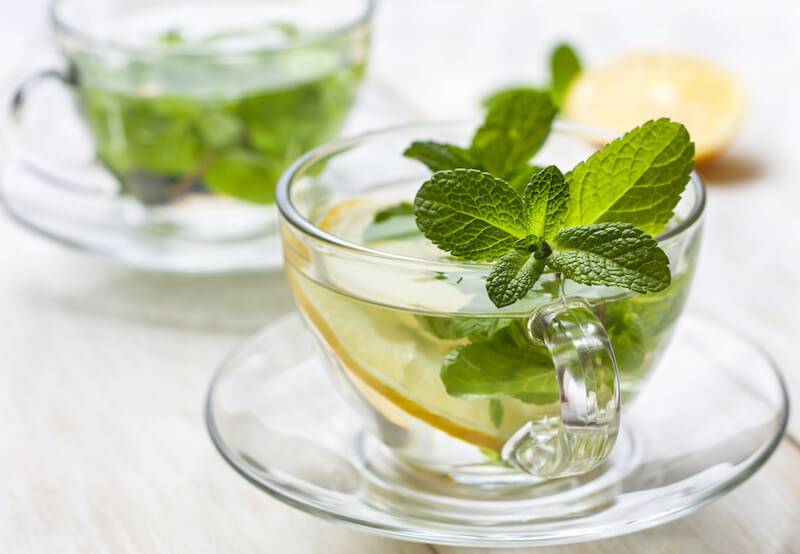Peppermint has been a holiday treat for hundreds of years, but it’s been used as a holistic health plant for thousands of years by Eastern countries like Asia and Europe. Nowadays it flavors anything from breath mints, soaps, and toothpaste to candy. However, to reach the full potential of this aromatic herb, peppermint tea is a great way to go. Although the tea itself hasn’t been studied, the compounds in its leaves, menthol, limonene, and menthone were found to have a laundry list of amazing benefits. (1) So, what are these benefits? And how much should you drink? Keep reading to learn all the reasons peppermint tea is great for Keto Zone.
1. Improves Digestion
In one study, peppermint oil capsules reduced IBS (Irritable Bowel Syndrome) symptoms by up to 40% after 4 weeks, and another showed that it lowered the duration and severity of stomach pain. (2,3) On top of relieving gas, bloating, and indigestion, peppermint can also alleviate vomiting and nausea, making it a great remedy for overall digestion health. (4)
2. Helps Tension Headaches
Applying peppermint oil to your temples can be as effective as using 1,000 mg of acetaminophen (Tylenol) for tension headaches and migraines according to one study. (5) The menthol increases blood flow and adds a cooling sensation, while the oil itself can act as a muscle relaxer. (6) Because of these results, it’s thought the aroma of peppermint tea might add some relief as well. So if you’re struggling with the dreaded keto headache, give it a try!
3. Battles Bad Bacteria
Menthol, the main ingredient in peppermint, is an antibacterial, and peppermint oil has been shown to kill dangerous bacteria like E. coli, Listeria, Salmonella, Staphylococcus, and pneumonia pathogens. (7,8,9) Studies also show it can lessen the number of bacteria found in your mouth. (10) But as you know by now, not all bacteria is bad! Read 8 Tips to Improve Gut Bacteria for Better Health on Keto Zone.
4. Alleviates Nasal Congestion
Since peppermint is antibacterial, antiviral, and anti-inflammatory, it may aid common cold and allergy side effects like nasal congestion. It’s been shown that menthol can help airflow in your nose, which means the steam from hot peppermint tea can help clear out sinuses and allow easier breathing. (11,12) In 2016, a study suggests that peppermint oil vapors can even clear up some upper respiratory infections. (13)
5. Increases Energy
In one 24-people study, each person took a peppermint oil capsule and experienced less fatigue during cognitive tests, and peppermint oil aromatherapy showed to help tiredness during the day. (14,15) This could mean the smell from drinking peppermint tea could help wake you up and boost energy. And since peppermint tea is naturally caffeine-free, you won’t experience any caffeine crashes.
6. Clears Bad Breath
Peppermint lessens the bacteria found in your mouth, like the kinds that cause excess plaque and gum disease. (16) Because of this and menthol’s strong, minty taste, many people find improvements in bad breath. Such as this study in 2017, where those who received a peppermint, tea tree, and lemon oil rinse after spine surgery saw significant improvements compared to those who didn’t. (17) Those who are going through keto flu bad breath might find drinking peppermint tea helpful!
How Much to Drink
Since peppermint tea is calorie and caffeine-free, you can drink it without worrying about weight gain or caffeine-induced insomnia. At the moment, there isn’t an exact recommended daily intake, but starting with 1-2 cups per day is good– one for the morning, and one for the afternoon slump! If you want to make your tea more filling, add heavy cream or MCT Oil Powder. To sweeten it, use keto-friendly sweeteners like stevia or erythritol.
Keep in mind that if you have gastroesophageal reflux disease (GERD) or heartburn, peppermint tea has sometimes been shown to worsen symptoms. And it is possible to be allergic to peppermint or its naturally occurring chemicals like menthol. So, if you are allergic, stay away from peppermint tea, as it may induce reactions.
Homemade Peppermint Tea
Peppermint tea is two ingredients: peppermint leaves and water. You don’t even have to buy it in teabag form! Just boil 2 cups of water, remove it from the heat, then dump in 4-5 torn peppermint leaves into the water. Cover the pot with a lid, and steep for 5 minutes. Strain the tea, pour it into a mug, and enjoy! To really embrace the homemade version, you can also grow peppermint leaves in your backyard.
Bottom Line
Although the peppermint tea connection hasn’t been directly studied, peppermint oil, which is on the list of 7 Essential Therapeutic Oils, has proven to have so many incredible benefits. And since peppermint tea is a derivative of the oil, we can only conclude it to have similar positive effects! Drink it at any time of the day: after a meal to ease digestion, in the afternoon for a caffeine-free energy boost, or after your morning coffee to freshen your breath. Either way, the health benefits are a quick way to increase your wellbeing. Shop here for more wellness-boosting supplements!

Leave a Reply